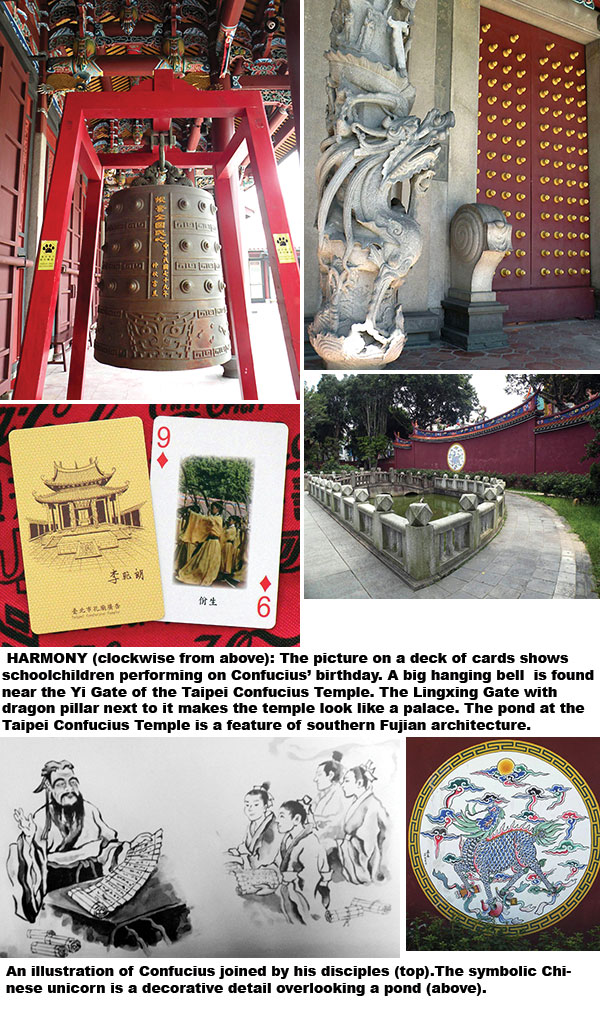Revisiting the world of Confucius the Great Sage
MANILA, Philippines - Confucius the Great Sage lives to this day through his school of thought based on bene-volence and rites. In fact, Confucianism has been the cornerstone of Chinese culture for more than 2,500 years.
The Taipei Confucius Temple, a solemn landmark which attracts visitors the whole year round, comes truly alive to honor the memory of the foremost teacher Confucius on Sept. 28 every year. Schoolchildren with peacock feathers in their grip don ceremonial robes and caps to participate in the millennia-old ritual to invoke the spirit of the Grand Master, known to have had far-reaching and profound influence on Chinese life for thousands of years.
The rehearsed dance movements, once lamented Taiwanese scholar and researcher Chuang Pen-li though, have undergone changes over the years. Hand movements with no historical basis have been added. The stylized choreography has picked up a faster tempo, too. As always, in accordance with the Confucian code, males dominate the performance.
According to principles corresponding to Confucius’ belief, life should be organized into five reciprocal relationships: emperor (present-day president)-subject, father (teacher)-son (student), husband-wife, older brother-younger brother and senior friend-junior friend.
Husband, father and president are assigned leading roles. There is male gender preference. Subservience is expected of the other end of the equation in relationship.
Confucius also taught that social harmony is more important than performance in any organization’s activity. Don’t rock the boat. The superior must take the blame if his subordinates do not perform well. Thus, he does not write critical evaluations.
Study with diligence and discipline, stressed Confucius. Aspire to acquire classical learning and seek knowledge always. Set up a goal based on moral principles and walk the path of virtue. Pursue the arts.
The 4-D experience offered by the Taipei Confucius Temple presents the landmark’s history dating back to 1879 in the Qing Dynasty, and its architectural features include roof gargoyles and dragon pillars. Special effects like wind, falling snow and vibrations inside the theater enhance the journey into the world of Confucius.
Likewise a film screening at the Minglun Hall introduces the Confucian Six Arts toward a well-rounded education: rites, music, archery, chariot-riding, calligraphy and computation.
All told, the temple devoted to Confucius tries to help visitors flip through some of the chapters in the “Analects” of Confucius through films with different plots.
Rites as taught by Confucius had to do with deities of heaven and earth as well as ancestral spirits. Ceremonial ancient dance and music were dictated by social class. Confucius also urged his students to pick up the skill of archery not just for the development of their physical well-being, because this acquired ability required a focused mind, too. Great wealth and respect, as pointed out also by Confucius, were the rewards which awaited those who proved outstanding in riding in ancient times.
Calligraphy as taught by Confucius put importance on writing and word choice. Chinese characters began with the tying of knots. Evolving pictographs as highlighted in a gallery gave birth to different scripts – from bone oracle script all the way to the cursive and semi-cursive scripts.
As noted at the Taipei Confucius Temple, computation covered in the Six Arts had to do with the nine algorithms of basic math.
Tourists who turn up to catch the 4-D theater screenings even receive free souvenir decks of cards from the Taipei Confucius Temple.
A tour of the premises built by the people rather than by the government but now under the administration of Taipei City begins at the Wall of Supreme Knowledge. The garden inside is planted to peach and plum trees in keeping with a popular Chinese saying to mean Confucian teaching through countless generations of scholars and followers prevails all over the world.
A pond, a typical feature in southern Fujian architecture, has a Chinese unicorn – symbol of longevity, grandeur, fidelity, illustrious offspring and wise administration – overlooking it from the background wall. In ancient times, only the scholar who managed to place first in the civil service examinations was allowed to cross the bridge over such a half moon-shaped pond.
Visitors must pass through the Gate of Learning, the Lingxing Gate and the Yi Gate to arrive in front of the Dacheng Hall.
The Lingxing Gate, which gives the temple the look of a palace, took its name from the star sign for success in literature or writing. There are 108 decorative studs on the red door itself. Dragon pillars and drum-shaped stones serving as buffer flank this gate. Flower and bird patterns also decorate this area.
The Yi Gate is the main entrance to the courtyard where elaborate ceremonies in honor of Confucius are held. Two side doors are used on ordinary days.
Once inside, visitors can find an enormous traditional drum and a big hanging bell. Classical Chinese serial bell can also be heard during rites in the Taipei Confucius Temple.
Education without discrimination for all, says a big Chinese sign in the Dacheng Hall or the Great Achievement Hall. This was what Confucius believed in. Disciples of Confucius and scholars of Confucianism of the later dynasties have niches of honor in the East Building and the West Building on the two sides of the Dacheng Hall.
On a beautiful day, artists are inspired to set up their easels and do on-the-spot painting in the picturesque premises of the Taipei Confucius Temple. For most visitors, however, the tour helps them to begin to grasp why Confucianist scholar Zhu Xi of the Southern Song Dynasty said: “Thousand years of history would be like a long dark night without Confucius.”
- Latest
- Trending















